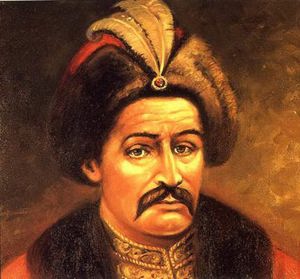The passion of Ivan Mazepa
An unknown attempt to abolish the anathema on the Ukrainian hetman
Moscow Patriarch Kirill’s fairly recent pompous visit to Ukraine caused varying responses within the Ukrainian Orthodox community, general public, and expert quarters. In fact, the Moscow Patriarch was received on a level and with security arrangements befitting a visiting head of state. Ditto preparations for the visit. Patriarch Kirill’s secret letter to the Ukrainian leadership, requesting that Ivan Mazepa Street be renamed Lavra Street, was a test of strength of the pro-Kremlin streak of Ukraine’s current government. Contrary to the Russian Orthodox Church’s spokesman Vladimir Legoida’s statements denying this request in writing, on July 8, 2010, the Kyiv City Council resolved to rename part of Ivan Mazepa Street (vulytsia Ivana Mazepy) to Lavra St. (Lavrska vulytsia), with the main argument on the part of some officials of the Moscow Patriarchate invariably being that the street leading to the Lavra (Kyiv Hagia Sophia) cannot be named after a man who was excommunicated.
Theological and political debates on the possibility/impossibility of lifting the 1708 anathema on Hetman Ivan Mazepa continue, with historical studies playing a major role. In 2009, Metropolitan Dymytri (Rudiuk) [of the Kyiv Patriarchate] published “The Historical Memorandum on the Anathema on Hetman Ivan Mazepa,” which testifies to the illegitimate, unchristian, and unjust nature of Mazepa’s excommunication. Ex-President Viktor Yushchenko at one time even asked Moscow Patriarch Aleksii II to consider the possibility of abolishing the anathema.
A unique event that marked the spread of an essentially different attitude to the hetman’s excommunication was a memorial service ceremoniously conducted by Bishop Nazarii (Blinov) in front of St. Sophia’s Cathedral on November 18, 1918. A prayer for the departed and officially excommunicated hetman was offered up for the first time in 209 years. This event and its background was thoroughly analyzed by the historian, Andrei Starodubtsev. His archival findings point to the lifting of the anathema on Ivan Mazepa as being on the agenda of a meeting of bishops under the aegis of the All-Russian Local Church Council of 1917-18 (this deliberation was, however, postponed for an indefinite period).
Another attempt to synodically abolish the anathema was initiated by Archbishop Hilarion (Ohienko) of Chelm and Podlachia on February 17, 1941, precisely eight years after the resolution of the Synod of the Orthodox Church of Poland that allowed prayers for the departed Ivan Mazepa. Prior to the hetman’s 302nd birthday, Archbishop Hilarion addressed the Council of Bishops of the Orthodox Church of Poland (then Russia’s Governorate General) “with regard to the lifting of the anathema uncanonically imposed by the Russian Orthodox Church on the Hetman of Ukraine, Ivan Mazepa, blessed be his memory, and allowing the Orthodox adherents in the Governorate General to offer up prayers for the departed, most pious, Hetman, the devout protector of the Orthodox faith.”
In response, two other members of the Council of Bishops, Metropolitan Dionysius (Waledinski) of Warsaw and Archbishop Palladius (Wydybida-Rudenko) of Krakow and Lemkivshchyna, submitted a letter on March 1, 1941, in which they concurred that this anathema was political rather than religious. However, they did not consider themselves to be competent enough to abolish it, considering that it could be lifted only by the religious authority that had performed the excommunication — in other words, the Russian Orthodox Church. The bishops proposed to abide by the Solomonic decision made by the Synod in 1933, that, “without foreboding the issue of lifting the anathema, it is hereby resolved that the anathema pronounced by the Russian Holy Synod against Hetman Ivan Mazepa, blessed be his memory, shall not be binding on the adherents of our Holy Autocephalous Orthodox Church…” And so the Autocephalous Orthodox Church faithful could now pray for the departed hetman. The bishops believed that they had thus worthily settled the matter for the Ukrainian Orthodox community. This document is stored in the archives of the Orthodox Diocese in Warsaw. It is proof that the Ukrainian national church circles continued to struggle for the nullification of the illegitimate anathema and prayed for the great hetman’s soul even under the Nazi occupation.
Metropolitan Hilarion had another cause to return to the matter on July 6, 1959, when the Council of Bishops of the Ukrainian Greek Orthodox Church of Canada adopted a letter that read, “We consider the anathema pronounced in 1708 against Hetman Ivan Mazepa to be null and void; we regard Hetman Ivan Mazepa as an outstanding and profoundly religious statesman. Therefore, we give our blessings to all our clergy and adherents for them to pray for, and cherish the blessed memory of, Hetman Ivan Mazepa, as a faithful and pious son of the Ukrainian Orthodox Church.” Regrettably, all these statements and resolutions recognize only the uncanonical nature of Mazepa’s excommunication and allow the faithful to pray for his soul. This gives the Moscow Patriarchate cause to reiterate that there doesn’t exist a single document lifting the 1708 anathema. The Council of the Russian Orthodox Church has the final say in the matter. It was probably with this in mind that, on November 14, 2007, the Synod of the Ukrainian Orthodox Church, jointly with the Moscow Patriarchate, instructed the Ukrainian Orthodox Church’s Theological Commission and the Theological Academy of Kyiv to investigate all the canonical and historical circumstances pertaining to the case.
Members of the said commission ought to pay attention to what Archimandrite Job (Getcha), a noted clergyman of the Constantinople Patriarchate, had to say: “I see no church, theological or canonical reasons against the lifting of the anathema on this celebrated hetman.” There must be other, political factors that do not allow the Moscow Patriarchate to make a just decision in this case. The fact remains that the Mazepa exponents have no place in the Moscow Patriarchate’s new concept of the “Russian world,” and that the Kremlin keeps using St. Daniel’s Monastery as a tool of its neo-imperialistic ambitions.
Andrii Smyrnov holds a Ph.D. in History at the Ostroh Academy National University






